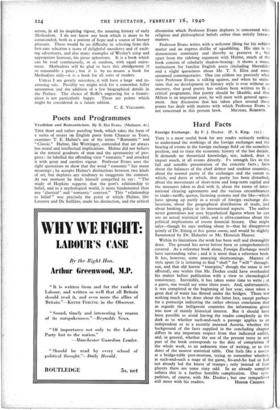Poets and Programmes
Tradition and Romanticism. By B. Ifor Evans. (Methuen. 6s.) THIS short and rather puzzling book, which takes the form of a series of essays on English poets from Chaucer to Yeats, examines T. E. Hulme's use of the terms " Romantic " and " Classic." Hulme, like Worringer, contended that art always has moral and intellectual implications. Hulme did not believe, in the natural goodness of man and the spontaneity of pro- gress : he labelled the offending view " romantic " and attacked it with great and careless vigour. Professor Evans uses the right quotations to show that the word " romantic " has many meanings ; he accepts Hulme's distinctions between two kinds of art, but deplores any tendency to exaggerate the contrast. At one moment he finds himself compelled to say : " The study of Hopkins suggests that the poet's relationship to belief, and to a mythological world, is more fundamental than any ' classical' and ' romantic ' contrast." This " relationship to belief " was precisely the point at which Hulme, like Lasserre and De Seilliere, made his distinction, and the critical dissension which Professor Evans deplores is concerned with religious and philosophical beliefs rather than strictly literary matters.
Professor Evans writes with a welcome liking for his subject matter and an express dislike of squabbling. His aim is to demonstrate continuity and thereby to preserve it ; but apart from the sidelong argument with Hulme, much of the book consists of scholarly shadow-boxing : it shows a warm enthusiasm for familiar English poets (including Meredith) and a slight queasiness about Mr. T. S. Eliot and some unnamed contemporaries. One can seldom see precisely what view Professor Evans is talking against, and when he main- tains that no development in literary style is ever without an ancestry, that good poetry has seldom been written to fit a critical programme, that poetry should be likeable, and that Milton is an important poet, he will meet with general agree- ment. Any discussion that has taken place around these points has dealt with matters with which Professor Evans is
not concerned in this present book. MICHAEL ROBERTS.






































 Previous page
Previous page